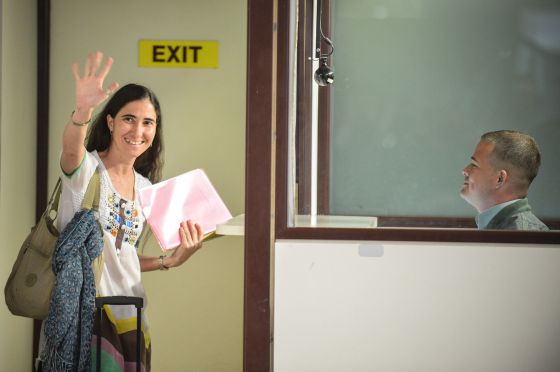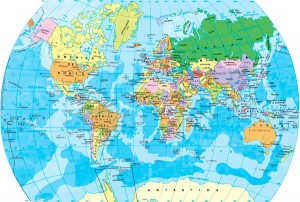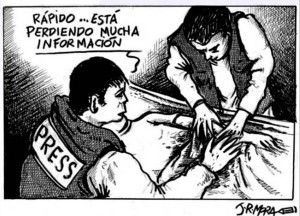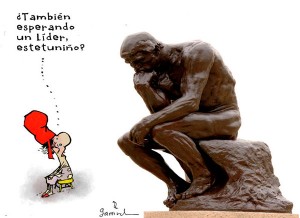
I’m sorry… I can’t cry victory just because (finally!) Yoani Sánchez, Eliécer Ávila, Rosa María Payá and others who, of course, will do it in the next months, now can travel without the humiliating exit permit. I read that many people are happy and sing victory and sentences abound like, “We won this battle,” and “We kicked the Castros’ ass.” “Now with freedom to enter and leave the island, the opposition can launch a strong campaign from the Exterior.” …even when all these and other “changes” are pure face makeup, more than ever, for the convenience of the regime in Havana.
I repeat, although it sounds alarmist: I don’t think that now is the time to claim victory. A dictatorship, even less so the Cuban one, never offers its arm to be twisted. A regime that rearranges itself in order to guarantee its future (that’s the only thing that has happened today on the island) does not take false steps.
I’ve learned that well. And I know that taking these steps that the world catalogues as “changes,” although they have been forced by some circumstances, already the masterminds of power in Havana must have established their national strategies, elaborated their connections with other similar powers in the rest of the world, and positioned their soldiers in the new game that they have already planned as well as possible and future plays.
One of the most recurrent mistakes that we Cubans have made during these five decades is to gloat over supposed victories against the Castro totalitarianism, which, as history has already shown, this dictatorship has not delayed in molding, demonstrating how silly we were to believe ourselves victors.
And it’s under this impact that, since they announced a couple of years ago that they were modifying the migration law, I have been poking around in certain historical sources that show the strategies used by Leftist dictatorships against the political opposition; I have been digging into, with my questions, the experience of established political analysts of the Socialist block; I have been irked with some investigative encomiendas (system of tributary labor in colonial Spain) and journalist colleagues of several countries where the “Cuban issue” still appears in the news from time to time.
“Do we Cubans want a true democratic change on the island; are we prepared to face something like that”? I wondered when I read the annotations that I made in all this time of investigation.
And the dictatorship plays cards that I already knew but which it held only to throw down so thoroughly as, I’m sure, it did on January 14, 2013, when the new migration law went into effect.
CUBA DOESN’T MATTER
 Let’s search for our country on this map of the world.
Let’s search for our country on this map of the world.
This is the first card in favor of the dictatorship. The immense majority of exiles or Cubans residing outside the island have barely stepped foot on “lands of liberty” than we discover that we are not the center of the world, as the “revolutionary” political propaganda would have us believe.
In reality, Cuba is only one little island more among hundreds of countries filled with terrible conflicts. The conflict in our country, although it’s also hard, terrible and has lasted more than 50 years, is only one more of the conflicts that happen in the world.
And because of that, even if it is logical that it be that way, our country is in the international news only on this that or the other occasion, and always scarcely for a few hours or a few days. We are not in any way, as Fidel Castro once said, the country where the destiny of humanity will be decided.
Raúl Castro’s dictatorship, like Fidel’s before him, knows very well how much blindness inoculates us, and we pretend we’re the center of the universe and that because of this the sacrifice of the people is vital for the human race.
A Soviet diplomat, now a well-known writer, commented to me some weeks ago that “in these 50 years Cuba was at the center of the international panorama uniquely on two occasions: when the Revolution triumphed in 1959 and during the Missile Crisis.” The other times, the feeling that all the eyes of the universe were watching Cubans, was a very contrived lie by Fidel (or that Fidel came to believe in his grandiose delirium, as another Polish colleague told me).
The dissidents who go out into the world must face this truth: Cuba doesn’t matter, or, to not wound our national ego, it matters very little. So the dictatorship counts on this to impede the impact that opponents who leave the island can have outside the island: “The new opposition will have their moments of media glory and later no one will remember them. We don’t have to worry about the old or the ones in exile, nobody now believes them,” said a Cuban State Security analyst recently in an event at the University of Computer Sciences.
THE DISEASE OF THE PRESS AND THE POLITICIANS

The Cuban novelist Justo Vasco told me in 2004, in Gijón, a truth that struck me: “We Cubans are important to the international press and the politicians as long as we feed their disease and their pockets. They love martyrs, not survivors.”
And that’s almost the whole truth: While you are a prisoner in Cuba, while the political police are beating you and throwing you in their prisons, while the paramilitary mobs pull at you and kick you, while you are stripped of all fear and confront the dictatorship of the island, the journalists of the world quote you from time to time, the politicians of other countries mention you in their beautiful speeches about universal democracy and human rights.
When you are already off the island, you serve them only while the media impact of your case lasts.
There are thousands of examples that demonstrate this truth: Cuban dissidents who political parties and powerful international institutions support by word and for whom they brandish the flag while they are suffering in Cuba, were (and still are) forgotten nobodies, even humiliated when they travel to those countries where they were spoken of so well. Their names are only rescued from that embarrassing oblivion when it’s convenient for some little battle of the politicians.
This is the other card that the dictatorship holds in its hands. And worse, because now the old opponents “have the liberty” of leaving for the world to denounce the repression, but they also carry in their suitcases an explosive cargo: “A system that permits its opponents to mount a political campaign outside and return to the country cleans up its image in such a way that whatever repression really happens on the island will be less credible.”
“Now, on the international scene we will no doubt witness a rebound of the idea that it’s false or partially uncertain that in Cuba a dictatorship exits.” These words were spoken to me by a very worried German friend, a member of the European Union parliament, just when I was interviewing him for an article that I published the past month of January on this theme in the German press.
This strategic loosening makes understandable the applause of the International Left for this type of dictatorship to permit the exit of its most notable opponents, just like the other “changes” that have happened lately on the island.
In one of my articles a few years ago I wrote how several of the intellectuals who historically, by cape and sword, defend the regime had confessed to me that the stubbornness of the Cuban government in not relaxing some rules tied their hands and legs because, these are their words, “You have to perform magic to defend the indefensible.”
And I am reminded of something that in this case is important: Although the Cuban government and its international acolytes crow the opposite, in the most important countries of the world (and above all in those where Cuba continues being of interest), a good part of the press is in the hands of a false Left that leans toward totalitarianism by using the same dirty strategies of manipulation and lies that the “enemy” press uses.
And for that reason we can’t hope that what the Cuban opposition says or does outside the island will have a true impact: for the Right (and other political tendencies with a certain power over the media), these opponents already don’t mean much because they have lost the “news disease,” and the Left will do everything possible to ignore them or, if it’s strictly necessary to talk about them, they will always attack them with defamation.
It’s a perfect game that favors of the dictatorship.
CAUDILLISMO: THIS NATIONAL ILLNESS
 Lech Walesa recently launched what I believe is the most serious and profound criticism against the Cuban opposition when he said, “There are too many leaders in the Cuban opposition.”
Lech Walesa recently launched what I believe is the most serious and profound criticism against the Cuban opposition when he said, “There are too many leaders in the Cuban opposition.”
This, the disunity derived from the caudillismo inside the ranks of the Cuban opposition, is another of the cards that the dictatorship has masterfully played in all these years.
But now there is a new nuance: “These mercenary dissidents, fabricated and financed by the United States, will start to preen before the international press, will give homage to their falsely heartbreaking political careers, and surely some stupid journalist or another will believe their lies. And that suits us.”
That phrase “That suits us” draws my attention because it was said by a Cuban diplomat in Europe at one of those so-many activities that Europeans encourage who continue looking at Cuba with the nostalgia of the ‘60s.
What the illustrious diplomat said made me remember that one of the papers by an official blogger in another event in Havana (celebrated in the Ministry of Exterior Commerce) says the following: “The opposition is full of cardboard caudillos….they look only at their navels, at the dollars that they receive, and the spaces of power that they are creating….That prevents them from occupying themselves with what, if they could accomplish it, would be the real work of the opposition, working with the masses, mobilizing the masses.”
And I emphasize this for a simple reason: In one of those press articles of the Left that supports the Cuban dictatorship (the radical press in Mexico that, scandalously everyone knows, is financed from Havana), I read in a reader’s comment the following:
“Erected by their own glory as heads of the opposition, a miniscule and ridiculous opposition, upon confronting the journalists of the monopolistic media, always avid about saying bad things about the Revolution, these bogus dissidents open their wings like peacocks and destroy themselves, already by speaking through the media they lose the credibility of their people who know very well who’s behind that press.”
It’s enough to tie together the coincidental ends to understand the strategy: The dictatorship bets that wrapped up in their leadership, these “caudillos” (as they call them) will miss the center of the target where they must aim if they want to foment change: working with the people, with the simple folk, taking their ideas every time to more people…and it bets also that, as a result of entire decades of manipulation, a good part of the people will increase the distrust they feel today for the dissidents, now that the government can present evidence that these “dissidents” attack the Cuban Revolution through a press that, they will say, has historically been on the side of imperialism.
OPPOSITION OR CHAOS?

“With the quantity of Cuban parties, Cuban political groups, and pro-democracy institutions that Cubans have outside and inside the island, and with the quantity of money that the Cuban opposition has received during decades of exile, it’s inconceivable that none of the changes that occurred inside the dictatorship are due to the work of all this support,” a Republican politician in the United States said in 2010, one whose name I prefer not to remember, announced as a “Cubanologist” at the event we were attending.
For him we Cubans were one of two things: either silly or stupid, and I would need to write a book to summarize the almost two hours of our discussion in which, among other things, I remember having said to him that a good part of the Cuban problem lay in the silliness or stupidity with which successive North American governments had assumed relations with the dictatorship.
But essentially his words, quoted earlier, were right. And it sickens me to verify that, in spite of counting on an ample platform of political tendencies that would guarantee a real democracy in a future Cuba, in spite of counting on an economically powerful exile community, and in spite of being certain that the struggle for democracy in Cuba receives some millions of dollars annually (to speak only of the monetary resources coming from the United States), we Cubans have not known how to put aside our differences, our interests (including some that are really dirty, perverse and opportunistic) in order to unite ourselves in a common mission: defeating the dictatorship which, whether or not we deny it, by our fault and only ours, is the longest dictatorship In history.
I am, in this sense, pessimistic: The actual state of disunion will continue. And I hope I’m wrong, but I don’t think that the Cuban opposition (neither on the island nor in exile) can confront disunited the repositioning strategy of the dictatorship. The opposition should also renew its strategies, should reposition itself in unity, if it doesn’t want to continue losing before the thrusts of a dictatorship that reinvents itself before our eyes every day.
THE CHALLENGES
First:
The leaders of the opposition (on the island and in exile) should place their bets on one word: unity, unity, unity. After accomplishing the goal of being united: rout out the dictatorship. There will be time to spare in a democratic field for returning to the differences that separate us.
Second:
An opposition without a press platform with concerted interests on the island, in exile and in the international environment, will continue being, as it is today, a silent opposition that won’t be able to have real impact on its people nor on the rest of the world. It’s no longer enough to have news groups in Miami, Madrid and some other capital.
I’m speaking about combined interests in the sphere of the media, as the powerful press media that today we consider monopolies did first, and how, most recently they have reunited nations around the ALBA project (governed by Caracas and Havana).
While the present state of news dispersal continues, we will continue to hear only this chirp of frail, lost chicks that today is “the Cuban press in exile.” (And note: This isn’t anything offensive against the excellent work that, on their own account, many of these press organs have done. It’s only a call, once more, for unity.)
And third:
As much for the opposition leaders on the island as those in exile, I think it’s important to not forget that, yes, it’s good that the world knows the truth about what is happening in Cuba, but it’s our people on the island who have to open their eyes, rid themselves of the fear sowed during years of dictatorship, make themselves see that among everyone, those there and us in exile, by uniting forces, interests, within the framework of plurality and respect for dialogue, we can accomplish that true change that Cuba, our common native land, needs.
That, lamentably according to what I see, is the only card that can give us success faced with the macabre and power-hungry strategy of the dictatorship. If we don’t do it, in 20 years we will be remembering, sadly, that one day they let the dissidents leave for the free world, that one day the government put blusher on its hairy mummy’s face, that the new Yoanis and the new Eliecers and the new Rodiles protested and are protesting from the island….but above all we will remember that, through our own fault, we Cubans continue to mourn, looking with nostalgia and pain at a past that we didn’t know how to change.
Translated by Regina Anavy
